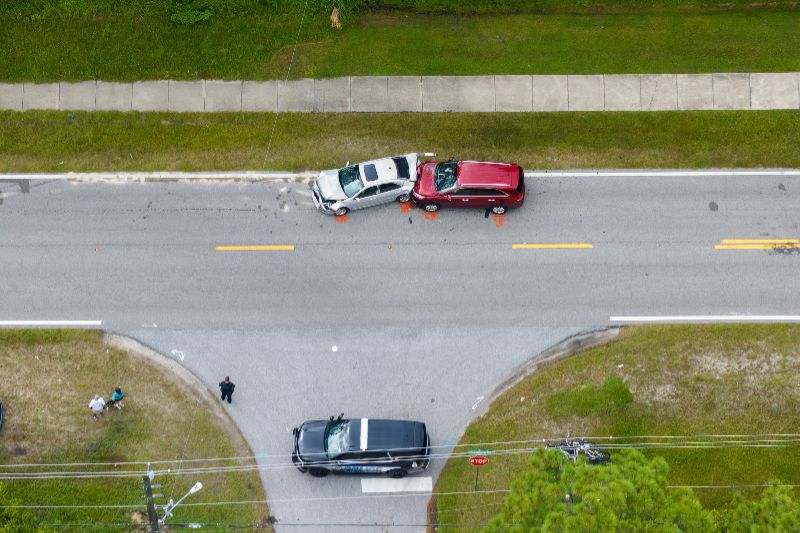Even a seemingly harmless fender bender in Kentucky can result in medical bills exceeding $50,000, far surpassing the state's minimum $10,000 Personal Injury Protection (PIP) coverage. Research shows that 45% of car accident victims still experience pain two years after their collision,and emergency room visits alone average $2,200-$3,300.Understanding Kentucky's unique "choice no-fault" insurance system and your legal rights becomes crucial when minor Kentucky car accidents and medical bills collide to create financial hardship.
At Flora Templeton Stuart Accident Injury Lawyers, we’re here to offer guidance and support—not pressure. Our goal is to help you understand your rights and feel empowered to make informed decisions. If you have questions, reach out for a free, no-obligation consultation. Call us today at 888-782-9090.

When $500 in car damage leads to $50,000 in medical bills
Modern vehicles are engineered to absorb impact, protecting the car's structure while potentially transferring more force to occupants. Kentucky law requires accident reporting when property damage exceeds $500 under KRS 189.635, but medical research reveals that injuries can occur at collision speeds as low as 2.5 mph—well below the threshold for visible vehicle damage.
Consider rear-end collisions, Kentucky's most common accident type. At just 5 mph, these crashes can cause whiplash affecting 800,000 Americans annually. The Cleveland Clinic reports that 14-42% of whiplash victims deleop chronic symptoms lasing months or years. Inital emergency room treatment costs $2,200-$3,300, but if complictions arise requiring MRI scans ($400-$12,000) or surgery ($25,000-$75,000), medical expenses quicklu spiral beyond Kentucky's minimum insurance coverage.
Parking lot accidents present another deceptive scenario. These low-speed collisions between backing vehicles often produce minimal property damage but can cause traumatic brain injuries when heads strike windows or steering wheels.Even without direct impact, the brain's movement within the skull during sudden stops can result in concussionsrequiring months of specialized treatment costing tens of thousands of dollars.
Kentucky's insurance maze: Understanding your coverage limits
Kentucky's "choice no-fault" system under the Motor Vehicle Reparations Act creates unique challenges for accident victims. All drivers must carry minimum PIP coverage of $10,000 unless they specifically reject it by filing forms with the Kentucky Department of Insurance. This coverage pays medical expenses and lost wages (up to $200 weekly) regardless of fault,but serious injuries quickly exhaust these benefits.
To pursue additional compensation from the at-fault driver, you must meet Kentucky's threshold requirements: either accumulate $1,000 in medical expenses or suffer specific serious injuries including permanent disfigurement, fractures of weight-bearing bones, permanent injury, or death.This threshold, established under KRS 304.39-060, means that even substantial medical bills below $1,000 may leave you without recourse for pain and suffering damages.
The state requires minimum liability coverage of $25,000 per person and $50,000 per accident for bodily injury, plus $25,000 for property damage.However, with 15.8% of Kentucky drivers uninsured, purchasing uninsured/underinsured motorist coverage becomes essential protection.Insurance companies must offer this coverage, though drivers can reject it in writing—a decision that proves costly when serious injuries occur.
Hidden injuries that emerge days or weeks later
Adrenaline and shock mask injury symptoms immediately following accidents, creating false impressions of minimal harm. Medical experts emphasize that soft tissue injuries, particularly to the neck and back, often manifest 24-72 hours post-collision. Some conditions, like late whiplash syndrome, can develop up to six months after the accident.
Traumatic brain injuries present particular diagnostic challenges. The National Institute of Neurological Disorders reports that 34 million people globally sustain TBI in traffic collisions annually, with many cases occurring without direct head impact.Symptoms including headaches, dizziness, memory problems, and concentration difficulties may emerge gradually,requiring expensive neurological testing and long-term treatment.
Spinal injuries follow similar patterns. Herniated discs from sudden jolting movements may not cause immediate pain but can lead to nerve compression requiring surgery weeks later.Kentucky's "eggshell skull rule" holds at-fault drivers liable for aggravating pre-existing conditions, meaning minor accidents can trigger major medical interventions for vulnerable individuals.
Navigating insurance company tactics and bad faith practices
Insurance companies may employ various strategies to minimize payouts on claims they perceive as "minor." Common tactics include offering quick settlements before injury extent becomes clear, arguing that minimal vehicle damage precludes serious injuries, and requesting excessive documentation to delay claims.Kentucky's Unfair Claims Settlement Practices Act (KRS 304.12-230) prohibits these practices, but enforcement requires vigilance.
Under Kentucky law, both first-party and third-party bad faith claims are permitted. If insurers lack reasonable basis for denying claims or act with reckless disregard for policyholder rights, they face liability beyond policy limits. Overdue PIP payments accrue 12% interest, or 18% plus attorney fees if unreasonably delayed, providing leverage against recalcitrant insurers.
Documentation proves critical when challenging insurance companies. Photograph vehicle damage, seek immediate medical evaluation even without apparent injuries, and maintain detailed records of all accident-related expenses.Insurance adjusters often use gaps in treatment or delayed medical care to dispute injury causation, making prompt action essential.
Local resources: Where Kentucky residents seek treatment and justice
Kentucky's medical infrastructure includes two Level I trauma centers—University of Louisville Hospital and UK HealthCare's Albert B. Chandler Hospital—equipped to handle severe injuries from seemingly minor accidents.Major health systems like Norton Healthcare, Baptist Health, and UK HealthCare operate throughout the state, though treatment costs vary significantly between facilities.
The Kentucky Justice Association, representing nearly 1,400 members, provides consumer education about legal rights following accidents.The Kentucky Bar Association offers lawyer referral services, while programs like the Crime Victims Compensation Board assist qualifying victims, though auto accidents only qualify when involving DUI violations or intentional acts.
Recent statistics paint a concerning picture: Kentucky documented 130,042 car accidents in 2022, with one in 22 drivers involved in collisions. Jefferson County (Louisville) led with 32,639 collisions, followed by Fayette County (Lexington) with 13,787.Despite ranking third-lowest nationally for speed-related fatalities, the state saw 813 traffic deaths in 2023, its highest since 2016.
Critical questions every Kentucky driver should ask
"Do I need to report a fender bender in Kentucky?" Yes, if property damage exceeds $500 or any injury occurs. File a Civilian Collision Report with Kentucky State Police within 10 days unless police responded to the scene.Even for minor damage, obtaining a police report protects your legal rights.
"How long do I have to see a doctor after an accident?" While Kentucky law sets no specific deadline, prompt medical attention ensures PIP coverage and creates crucial documentation.Delayed treatment complicates injury claims and allows insurers to dispute causation.
"What if my medical bills exceed PIP coverage?" After exhausting $10,000 PIP benefits, private health insurance becomes secondary coverage.You can pursue claims against at-fault drivers if meeting threshold requirements.Uninsured/underinsured motorist coverage provides additional protection.
"Can I sue if it was a minor accident?" Yes, if medical expenses exceed $1,000 or injuries include fractures, permanent injury, or disfigurement.Kentucky's choice no-fault system allows opting out of restrictions by filing proper forms with the Department of Insurance.

Protecting yourself from financial devastation
Understanding the unexpected consequences of small car accidents in Kentucky requires recognizing that vehicle damage poorly predicts injury severity. Minor collisions causing $500 in property damage can result in $50,000 or more in medical expenses,especially when involving hidden injuries like traumatic brain injuries or aggravated pre-existing conditions.
Purchase PIP coverage beyond the $10,000 minimum and maintain robust uninsured/underinsured motorist protection.Following any accident, seek medical evaluation within 24 hours,document everything meticulously, and consult legal counsel before accepting insurance settlements. Kentucky's two-year statute of limitations provides time for thorough evaluation, but early action prevents complications.
Minor Kentucky car accidents and medical bills create a perfect storm of financial risk when combined with limited insurance coverage, hidden injuries, and aggressive insurance tactics. By understanding your rights under Kentucky law, recognizing warning signs of serious injuries, and taking protective measures, you can avoid letting a fender bender derail your financial future. Remember that in Kentucky's pure comparative negligence system, even partial fault doesn't eliminate your right to compensation—but only if you act wisely and promptly to protect your interests.
At Flora Templeton Stuart Accident Injury Lawyers, we’re here to offer guidance and support—not pressure. Our goal is to help you understand your rights and feel empowered to make informed decisions. If you have questions, reach out for a free, no-obligation consultation. Call us today at 888-782-9090.

